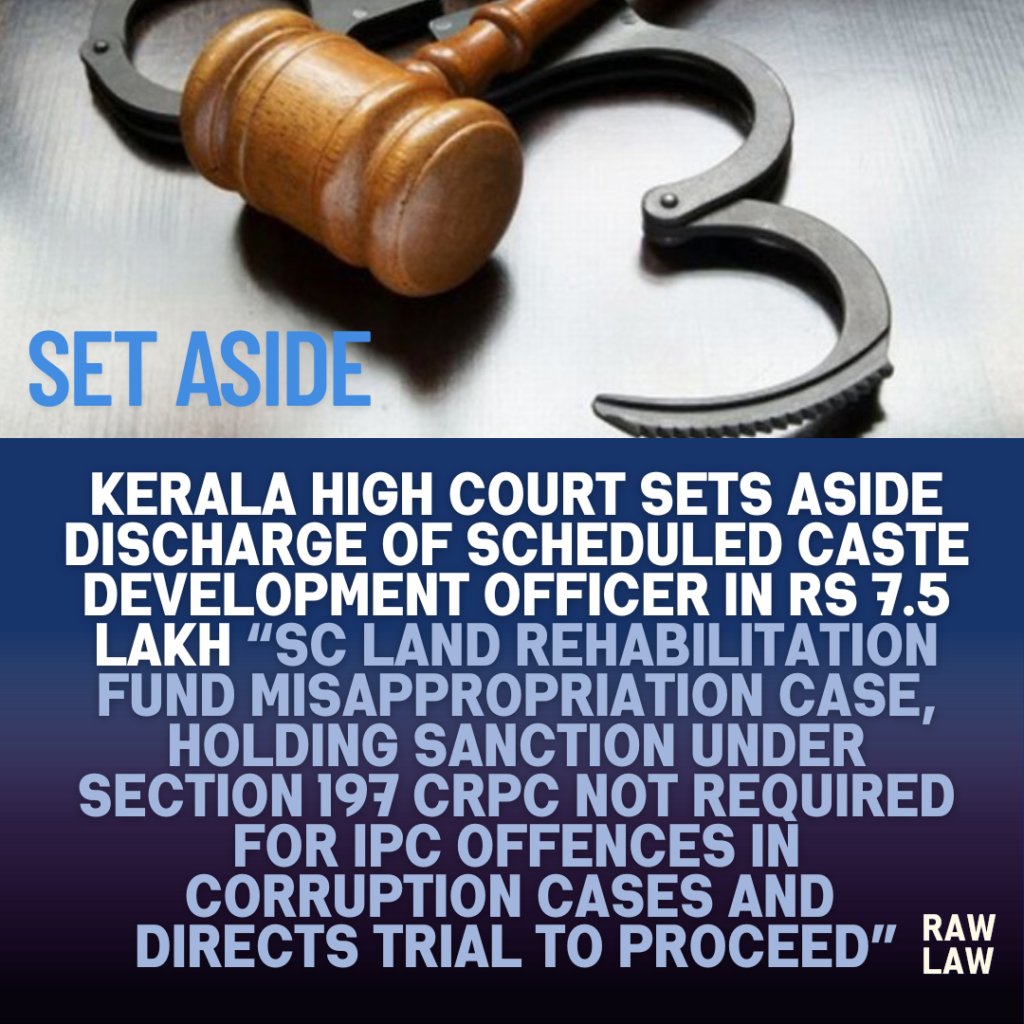Court’s Decision
The Kerala High Court allowed the State’s revision, set aside the Special Court’s order discharging the second accused, and directed the Special Court to frame charges and proceed with trial against the accused in the alleged misappropriation of Rs 7.5 lakhs under the “Rehabilitation of Landless and Homeless Scheduled Caste People” scheme. The Court held that no prior sanction under Section 197 CrPC was required for prosecuting IPC offences in corruption cases and that sufficient prima facie material existed to frame charges and continue the trial.
Facts
The case arose from allegations that the first accused, with the connivance of the second accused (Scheduled Caste Development Officer) and the third accused (document writer), misappropriated Rs 7.5 lakhs meant for Scheduled Caste landless beneficiaries in Kalpetta Block under the government rehabilitation scheme. It was alleged that forged sale deeds were executed in the names of 10 beneficiaries without their consent, using the land of the first accused, who then withdrew funds fraudulently. The Official Liquidator and departmental reports indicated procedural violations. The Special Court discharged the second accused citing lack of sanction under Section 197 CrPC and absence of allegations of misappropriation by the officer, prompting the State to file a revision.
Issues
- Whether sanction under Section 197 CrPC was necessary to prosecute the second accused for IPC offences in a corruption case.
- Whether sufficient prima facie material existed to frame charges and proceed with the trial against the second accused.
- Whether the discharge order passed by the Special Court was legally sustainable.
Petitioner’s Arguments
The State argued:
- Sanction under Section 197 CrPC was not required to prosecute public servants for IPC offences like Sections 420, 467, 468, 471, and 120B, relying on Prakash Singh Badal v. State of Punjab and Om Kr. Dhankar v. State of Haryana.
- Sufficient prima facie materials, including witness statements and documentary evidence, established the second accused’s involvement in collusion with the first accused, bypassing beneficiary verification, and enabling fraudulent withdrawal.
- The discharge order was passed without considering the gravity of the allegations and available evidence.
Respondent’s Arguments
The second accused argued:
- Sanction under Section 197 CrPC was mandatory for prosecuting a public servant.
- The second accused was not involved in any conspiracy, and verifying documents relied on the presumption of genuineness for registered documents.
- The role of verifying beneficiaries lay with field promoters, not with the officer, and the case lacked primary evidence to establish conspiracy or fraud.
Analysis of the Law
The Court analysed:
- The distinction between acts committed “while acting or purporting to act in the discharge of official duty” and acts constituting offences under IPC provisions in corruption cases.
- It applied Prakash Singh Badal v. State of Punjab to clarify that offences under Sections 420, 467, 468, 471, and 120B IPC do not attract the protection of Section 197 CrPC.
- It reaffirmed that Om Kr. Dhankar v. State of Haryana held no sanction is needed for prosecuting IPC offences where official status merely provides the opportunity to commit the offence.
Precedent Analysis
The Court relied upon:
- Prakash Singh Badal v. State of Punjab (2007 1 SCC 1): Held that no sanction under Section 197 CrPC is required for IPC offences in corruption cases.
- Om Kr. Dhankar v. State of Haryana (2012 2 KLT 106): Affirmed the non-requirement of sanction for IPC offences in corruption prosecutions.
- Cited State of U.P. v. Paras Nath Singh (2009 6 SCC 372) to support the interpretation of procedural requirements in corruption cases.
Court’s Reasoning
The Court noted:
- Witness statements, including those from departmental officers and field promoters, indicated the second accused bypassed mandatory verification of beneficiaries, failed to insist on documentation, and enabled fraudulent encashment of funds.
- Money was encashed and later refunded, with part of it routed through the account of the second accused’s sister.
- The determination of whether the second accused’s actions constituted conspiracy and abuse of office required a full trial based on evidence, not discharge at the pre-trial stage.
- The Special Court’s view on sanction under Section 197 CrPC was incorrect, and sanction under Section 19 of the Prevention of Corruption Act had been duly obtained.
Conclusion
The Kerala High Court:
- Set aside the Special Court’s order discharging the second accused.
- Directed the Special Court to frame charges and proceed with the trial expeditiously.
- Clarified that observations in this order are confined to the discharge issue and will not bind the trial on merits.
Implications
- Reinforces that sanction under Section 197 CrPC is not required for IPC offences in corruption cases.
- Emphasises that discharge is not warranted where prima facie evidence supports allegations of conspiracy and corruption.
- Clarifies the scope of Prakash Singh Badal in pre-trial discharge matters under anti-corruption laws.
Referred Cases and Their Relevance
- Prakash Singh Badal v. State of Punjab: Clarified no Section 197 CrPC sanction is needed for IPC offences in corruption cases.
- Om Kr. Dhankar v. State of Haryana: Reiterated the above position.
- State of U.P. v. Paras Nath Singh: Discussed procedural safeguards in anti-corruption cases.
FAQs
Q1: Is prior sanction under Section 197 CrPC required to prosecute public servants for IPC offences in corruption cases?
No, sanction is not required for offences like Sections 420, 467, 468, 471, and 120B IPC in such cases.
Q2: Can a discharge be granted if there is prima facie evidence of conspiracy in corruption matters?
No, if prima facie evidence exists, the matter should proceed to trial for adjudication on merits.
Q3: What are the duties of officers under government schemes regarding beneficiary verification?
Officers are responsible for verifying beneficiaries, ensuring documentation, and preventing misuse of funds before releasing payments.



